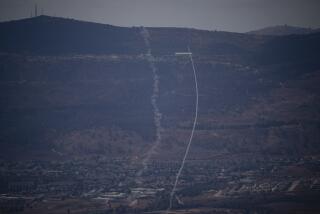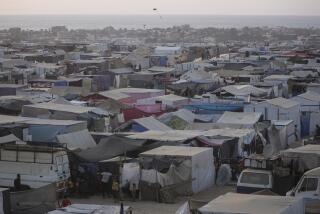U.S. Assails Kosovo ‘Genocide,’ Hints at NATO Protectorate
- Share via
WASHINGTON — The Clinton administration, conceding that airstrikes have failed to force Yugoslav President Slobodan Milosevic to accept a U.S.-backed peace agreement, is moving toward a new, more ambitious long-term goal: pushing all Yugoslav forces from Kosovo and declaring the province an autonomous zone under NATO protection.
“We’ve crossed a threshold during the past week, if we hadn’t crossed it already,” a senior U.S. official said Tuesday. “It’s now unthinkable that Kosovo could be ruled from Belgrade.”
Last week, when NATO launched the airstrikes, President Clinton said he still hoped Milosevic would accept a peace agreement that would grant Kosovo autonomy but keep it linked to Serbia.
But now, after a savage Serbian offensive against the ethnic Albanians who make up 90% of Kosovo’s population, administration officials say they are planning for a longer war than initially foreseen--ending in the imposition of a virtual NATO protectorate over the province.
Clinton hinted at the new objective Tuesday in a ceremony at the State Department, warning Milosevic: “He will see that his military will be seriously diminished . . . [and] international support for Serbia’s claim to Kosovo increasingly jeopardized.”
Other officials described two different military scenarios for the months ahead.
Some said a major aim of the airstrikes is to weaken Yugoslav forces enough to allow the ethnic Albanian guerrillas of the Kosovo Liberation Army to mount a counteroffensive.
After several weeks of bombing, “the playing field will have been greatly leveled,” one official said.
But others said the KLA may have already suffered too much damage to be a viable force. In that case, a White House official said, “We may just destroy [Serbia’s] military.”
Administration officials insist that they do not intend to use ground forces to achieve that goal--yet they have not completely ruled the idea out. “We don’t have all the answers to how this will turn out,” one official acknowledged.
“We’re not talking about weeks, though. We’re talking longer,” another official said.
Significantly, several officials now rule out any final outcome that does not include a complete withdrawal of Yugoslav army and police forces from the province.
“We’re not interested in an exit strategy that says, ‘OK, we’ve destroyed 80% of his army, that’s success,’ ” one said. “We’re aiming for a political outcome. . . . It is impossible for Milosevic to continue exercising authority in Kosovo. It is necessary for the international community to exercise authority in Kosovo.”
The new scenario comes with several problems. One is humanitarian: U.S. officials acknowledge that their strategy won’t do much in the short run for the ethnic Albanian civilians who are the victims of “ethnic cleansing.”
A second is military: The Yugoslav army has been systematically hunting down suspected KLA guerrillas, and U.S. officials aren’t sure how much of the guerrilla army remains.
A third is political: The KLA’s avowed aim is an independent Kosovo, an outcome the United States says it still doesn’t support.
“Our position on independence has not changed,” State Department spokesman James P. Rubin said Tuesday, then added: “There is something in between.”
What he meant, other officials said, was that a future Kosovo could exercise autonomy under the protection of NATO or some other international authority. “The borders wouldn’t change, but Yugoslavia would have no role,” one said.
Under such a plan, NATO forces would defend the province, and the remnants of the KLA might turn into a local security force.
That is a change from the peace agreement NATO tried to impose on both sides at a meeting last month in Rambouillet, France. The Rambouillet agreement would have granted administrative autonomy to Kosovo but disarmed the KLA and allowed Yugoslavia to retain some umbrella authority. The KLA reluctantly accepted the deal, but Milosevic rejected it.
That deal is no longer available, even if Milosevic wanted it, officials said. “We are in a post-Rambouillet world,” one said.
In his last-ditch attempt to avert the war, U.S. special envoy Richard Holbrooke warned Milosevic last week that if he rejected the Rambouillet terms, the allies would seek to strip Yugoslavia of its authority over Kosovo, officials said.
Experts outside the administration said the pursuit of these goals will draw Clinton inexorably toward the agonizing question of committing ground troops.
“These are coherent goals, but there’s no coherent military strategy behind them,” said Ivo Daalder of the nonpartisan Brookings Institution.
“Until now, we’ve had a military strategy that was designed to avoid failure. If our goal was solely to degrade [Yugoslavia’s] forces, that was achievable, no matter what happened. Now the administration is talking about more coherent political goals . . . but they are still trying to achieve them on the cheap. The only way to get Serbian ground forces out is to put NATO ground forces in.”
* YELTSIN CAUTIOUS
Russia won’t be pulled into fighting, president says. A20
* CONCERNED RELATIVES
Americans with family in Serbia have mounting phone bills. A21
* ISRAELI REACTION
Israelis are dismayed by leaders’ response to Kosovo killings. A22
More to Read
Sign up for Essential California
The most important California stories and recommendations in your inbox every morning.
You may occasionally receive promotional content from the Los Angeles Times.














